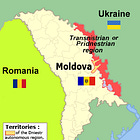Perspective: Energy Crisis - A Game of Bluffs, Leverage and Unanswered Questions
February 7, 2025
Today I want to take a step back and try to provide some analysis of what just happened over the last month in Moldova and Transnistria’s1 energy crisis. As I wrote this week it appears that the crisis is over… for now. At the same time it isn’t fully over as Moldova’s energy system continues to be intertwined with that of Transnistria and new challenges will come when the weather warms in the Spring. So today I want to look at the actions the various parties took (or proposed) and try to pierce through the rhetoric a bit to see what actually went on and what lies ahead.
Before we get going I suggest the following past articles as good primers on this crisis and the fraught relationship between Moldova and Transnistria.
In this article I tried to unpack why this crisis was unfolding and what (if any) strategy the Kremlin was employing. I think it holds up pretty well with one exception that we’ll get to below.
This older article examines the mess that Transnistria has found itself in since February 2022 and why there has been little hope of maintaining the status quo since that time.
In this podcast episode I spoke to Dr. William H Hill, Global Fellow at the Wilson Center and former Head of the OSCE Mission to Moldova from 2003 to 2006 and from 1999 to 2001, about the history of the conflict and past attempts at resolving it.
Evaluating the Rhetoric
First up we’re going to look at what Moldova, Transnistria and Russia were all saying about this crisis and how true those statements may or may not be. If you are looking for one area where things were not as they seemed you need not look further than Moldova and Ukraine’s offer to provide the MGRES power plant with additional coal. We’ll start there.
Moldova’s Offer: Coal for MGRES
When Russia stopped providing Transnistria with free gas on January 1st the region switched their primary power plan, MGRES, over to coal. The Transnistrian “authorities” claimed that the plant had emergency coal reserves for around 50 days of power generation. This was with rolling blackouts, a halt in industrial electrical usage and no electrical exports to Moldova.
From the beginning of the crisis Moldova has offered to facilitate the delivery of more coal to the power plant. This offer took various forms but at its most concrete involved the Ukrainians providing the coal at cheap prices or in exchange for electricity for the Odesa region. This offer was in the context of Moldova’s broader offer of immediate humanitarian aid coupled with offers of assisting Transnistria in buying gas on the European market.
Was this offer legitimate? Not really. Moldova and Ukraine were loudly offering this humanitarian assistance knowing with close to absolute certainty that it would not be accepted. Here’s why:




